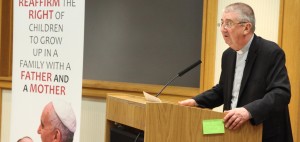
By Sarah Mac Donald - 07 May, 2015

Archbishop Diarmuid Martin gives his address on the theme ‘The Teaching of the Church on Marriage Today’. Pic John McElroy.
Archbishop Diarmuid Martin of Dublin has outlined his reasons for voting No in the marriage referendum, saying the proposal is not simply about extending accessibility to marriage but a real change in the definition of marriage.
In his address, ‘Marriage in the Constitution is Linked with the Family’ at All Hallows College on Wednesday, the Archbishop once again highlighted that genetic parentage is not irrelevant to the debate.
“We are all children of a male and a female and this must have relevance to our understanding of the way children should be nurtured and educated,” he stated and added that genetic make-up is a fundamental dimension of the intergenerational reality of family.
He told diocesan communications officers from around the country that no person exists who is not the fruit of a male and a female.
“Even if it were possible to clone a child, that child would still bear the genetic imprint of a male and a female. An individual man or an individual woman cannot generate another human being just on their own,” he said.
Elsewhere in his address, the Archbishop of Dublin asked what it means to be male and female?
Questioning if it simply a social construct, he acknowledged that there are some social constructs around the roles of men and women which have evolved in our societies which do not reflect the true understanding of men and women and which must be changed.
He explained that stressing the fundamental male – female relationship of complementarity does not mean wanting to put women back in the kitchen or pay them a lower wage.
“The fundamental male/female relationship inevitably has significance when we come to reflection of generating and nurturing children,” he said and highlighted that the generation of children is not just about biology.
However, he added that this is not the same as saying that people in differing marital and other relationships cannot be good parents, much less to deny that they even deserve the title parents.
Nor does it mean that all heterosexual parents are by that fact alone automatically good parents.
“It is important always to stress that all children, whatever the circumstances of their birth, should be loved unconditionally and treated with the same rights and dignity. This applies also to their rights within the Church,” he said.
Acknowledging that there is no formal definition of marriage in the Constitution, Archbishop Martin said the consistent legal interpretation of the Constitution is that it refers to a marriage between a man and a woman and that this recognition is fundamental and goes beyond any particular understanding of marriage that may have existed at the time of the writing of the Constitution.
The proposed change to the definition of marriage has significance for all citizens, he said and added that you cannot take one article of the Constitution in isolation.
“Marriage is not simply about a wedding ceremony or about two people being in love with each other.”
“Marriage, in the Constitution, is linked with the family and with a concept of family and to the mutuality of man and women which is the fundamental foundation for the family as it exists in the constitution today.”
Such fundamental questions about the good of society are clearly the concern of all, he said.
Elsewhere, Archbishop Diarmuid Martin criticised politicians who respond to the concerns of the No side with “broken gramophone-like quick sound-bites” and avoid rational debate.
In his address at All Hallows College, the Primate of Ireland said the fact that the Church was dogmatic in the past did not justify politicians replacing “sound bite-ism” for dogmatism.
He said the sound-bite culture couldn’t minimise the significance of what would change if the referendum is passed.
Publicly announcing his intention to vote No, he told the communications officers that he does not usually announce how he intends to vote or has voted.
However, he felt compelled to make his views known due to accusations made by the editor of the Catholic Voice newspaper reported in an article in the Irish Catholic newspaper suggesting he had “confused” the press by his attitude to the referendum in a recent Iona Institute address and “given constant solace to the yes campaign”.
He highlighted that the occasion for the “confusion” was a lengthy address he gave to the Iona Institute, the content of which neither the editor of the Irish Catholic or that of the Catholic Voice “considered worthy of reporting”.
On the proposed change to Article 41, Dr Martin argued that an ethics of equality does not require uniformity and this did not preclude recognition and respect of difference.
“A pluralist society can be creative in finding ways in which people of same-sex orientation have their rights and their loving and caring relationships recognised and cherished in a culture of difference, while respecting the uniqueness of the male-female relationship,” he said.
“I know that the harshness with which the Irish Church treated gay and lesbian people in the past – and in some cases still today – may make it hard for LGBT people to accept that I am sincere in what I am proposing,” he acknowledged.
This is made more complex when language is used which is insensitive and overly judgemental, he said and warned that the Church has to learn to voice its criticism clearly and without fear, but it must always do so in language which respects her Master.